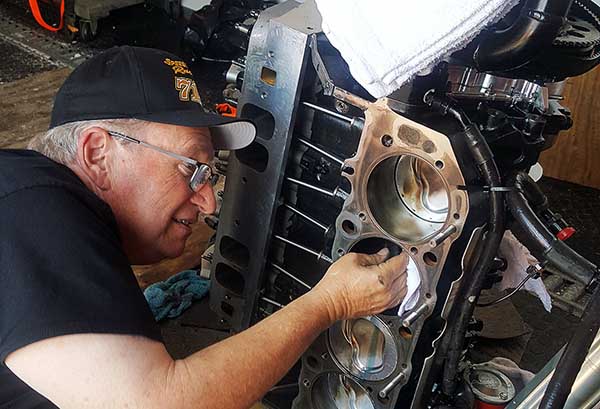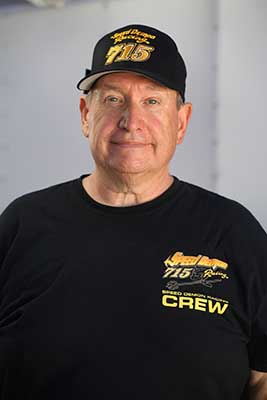
As the aerodynamicist for the Speed Demon 715 Streamliner team, Charles Jenckes had the job of making the 400-mile-per-hour-plus vehicle stable without increasing its drag. The UNC Charlotte assistant professor succeeded in his task, and the Speed Demon 715 car recently reached 481 miles per hour to set the record as the world’s fastest piston-powered wheel-driven ground vehicle.
 A faculty member in the Lee College of Engineering’s Mechanical Engineering Department, Jenckes puts into practice all of the theory and knowledge he teaches in the classroom to make the Speed Demon 715 car its best. In addition to working with the Speed Demon team, Jenckes has been a racing professional for more than 30 years. During his career, he worked for race teams throughout the United State and Europe, and most recently led the Computational Fluid Dynamics (CFD) Department for the Haas F1 Team.
A faculty member in the Lee College of Engineering’s Mechanical Engineering Department, Jenckes puts into practice all of the theory and knowledge he teaches in the classroom to make the Speed Demon 715 car its best. In addition to working with the Speed Demon team, Jenckes has been a racing professional for more than 30 years. During his career, he worked for race teams throughout the United State and Europe, and most recently led the Computational Fluid Dynamics (CFD) Department for the Haas F1 Team.
Jenckes taught as an adjunct professor in UNC Charlotte’s Motorsports Engineering program from 2014-19. In 2020, he joined the program full time as an assistant professor. He brings a wealth of real-world knowledge into the classroom, including his aerodynamic work on the Speed Demon.
“My work with Speed Demon is applied aerodynamics,” Jenckes said. “It is taking the theory and the analysis we see in computer simulations, applying it to the car, and seeing it work at more than 400 miles per hour.”
For the Speed Demon car, Jenckes said the three major components of the project were the build of the vehicle, the engine and the aerodynamics.
“This was a second-generation car,” Jenckes said. “I first got involved with the team as the chief aerodynamicist about five years ago, after the first car had been destroyed because of aerodynamic instability.”
The challenge of doing a total aerodynamic redesign of the car was to make it safer and more stable, without adding any drag that would slow it down.
“With this design challenge for a vehicle that runs in excess of 400 mph you can’t leave anything unattended,” Jenckes said. “When we do aero designs for Formula One or NASCAR, we use a lot of wind tunnel testing but that wasn’t available for this project. So, my work involved hundreds of hours of computer analysis and hundreds of CFD runs. It all worked, and we were able to solve the key issues from the aerodynamic design standpoint.”
With the overall design completed, Jenckes continued working with the team on refinements to specific aspects of the car, such as the location of turbo chargers and air intakes. Additionally, he was involved with the vehicle’s data collection and analysis. An expert in engines, Jenckes contributed to the maintenance of the 3,156-hp, 557ci, twin-turbo, methanol-fueled, Chevrolet V8 engine.
Steve Watt, the project manager for Speed Demon, said Jenckes’s involvement brings a huge boost to the team.
“Charles’s aero knowledge as a Ph.D. is a tremendous asset to what we do,” Wat said. “The car is so data driven that his help and the work of the other three guys dealing with the huge amounts of data is what made it possible to achieve the records this year. And Charles also gets down and dirty, laying on the floor of the trailer sanding out cylinders after we blew up an engine.”
Jenckes’s real-world expertise is a great attribute to students in the UNC Charlotte Motorsports classrooms, Watt said.
“At any time, he can tell you about 30 things on a car that are interesting to know,” he said. “When these things involve a car going 400 miles per hour, the kids are immediately interested and sit up and pay attention.”
During Bonneville Speed Week 2020, Speed Demon 715 posted a two-way average of 470.015 mph, setting a land-speed record for a piston-driven ground vehicle. It also set a top speed of 481.576 mph in the last mile, which is the fastest a piston-powered, wheel-driven ground vehicle has ever gone.
“I was small part of the team, but it was very rewarding work,” Jenckes said. “It was great to see what the team was able to achieve and to set the new record.”